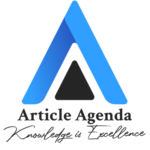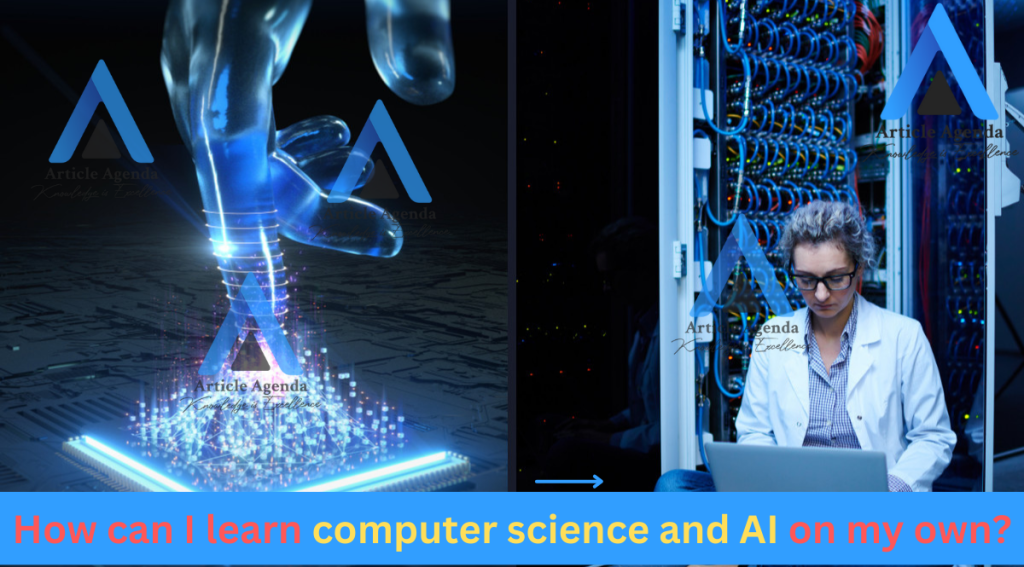Introduction
In today’s rapidly evolving world, computer science and artificial intelligence (AI) have become integral parts of our lives. These technologies transform how we live and work, from smartphones to self-driving cars. As a result, there is a growing demand for individuals with knowledge and skills in computer science and AI. If you’re interested in learning these subjects independently, this article will guide you through the steps to get started, provide valuable resources, and offer tips for successful self-learning.
Table of Contents
The importance of self-learning in computer science and AI
Self-learning is a crucial aspect of mastering computer science and AI. While formal education programs are available, the rapidly changing nature of these fields requires continuous learning and adaptation. By learning independently, you can stay up-to-date with the latest advancements and tailor your learning journey to your specific interests and goals.
One of the critical advantages of self-learning is the flexibility it offers. You can learn at your own pace, focusing on topics that interest you the most. This autonomy allows for a deeper understanding of the subjects and the ability to explore related areas. Additionally, self-learning encourages problem-solving skills and critical thinking, essential in computer science and AI.
Steps to get started with computer-science and AI
Getting started with computer-science and AI can be overwhelming, but breaking it down into manageable steps can make the process more approachable. Here are some steps to help you get started:
1. Define your goals: Begin by clarifying your goals and aspirations in computer-science and AI. Are you interested in developing AI algorithms or working with big data? Understanding your goals will help you focus your learning efforts and choose the right resources.
2. Familiarize yourself with the fundamentals: Start by gaining a solid foundation in computer science and AI concepts. This includes understanding algorithms, data structures, programming languages, and mathematical concepts. Online courses and textbooks can be valuable resources for learning these basics.
3. Explore online resources: The internet is a treasure trove of resources for learning computer-science and AI. Websites like Coursera, edX, and Khan Academy offer various courses and tutorials on various topics. Free online textbooks, forums, and blogs can provide valuable insights and explanations.
Fundamental concepts in computer-science and AI
To truly grasp computer-science and AI, it’s essential to have a strong understanding of the fundamental concepts. Here are some key areas to focus on:
1. Algorithms and data structures: Algorithms are step-by-step procedures for solving problems, while data structures are how data is organized and stored. Understanding algorithms and data structures is crucial for efficient computer-science and AI problem-solving.
2. Programming languages: Familiarize yourself with popular programming languages like Python, Java, and C++. Each language has its strengths and weaknesses, but Python is often recommended for beginners due to its simplicity and versatility.
3. Machine learning and neural networks: Machine learning is a subset of AI that focuses on enabling computers to learn from data without being explicitly programmed. Neural networks, a key component of machine learning, are algorithms inspired by the human brain to recognize patterns and make predictions.
Read More : How can a computer scientist survive in the AI era?
Online resources for learning computer-science and AI
The internet offers a wealth of resources for learning computer-science and AI. Here are some highly recommended websites and platforms to explore:
1. Coursera: Coursera is an online learning platform offering courses from top universities and institutions. They provide computer-science and AI courses, including beginner and advanced levels. Many courses offer certificates upon completion.
2. edX: Like Coursera, edX offers courses from prestigious universities and institutions. They have a vast selection of computer-science and AI courses, many of which are self-paced and accessible to audit; certificates and even degree programs are available for those seeking official recognition.
3. Khan Academy: Khan Academy is a non-profit educational organization that provides free online courses and tutorials. While they primarily target K-12 education, their computer-science and AI courses are suitable for beginners and offer a solid foundation.
These platforms offer a variety of learning formats, including video lectures, quizzes, and hands-on projects. Explore their course catalogues, read reviews, and choose the ones that align with your learning goals and preferences.
Coding languages and tools for computer-science and AI
Coding languages and tools play a crucial role in computer-science and AI. Here are some commonly used languages and tools in these fields:
1. Python is a versatile and beginner-friendly programming language widely used in AI and data science. It has a large and active community, making it easy to find resources and support.
2. R: R is another popular data analysis and statistical computing language. It is widely used in AI research, particularly in natural language processing and data visualization.
3. TensorFlow and PyTorch: TensorFlow and PyTorch are popular libraries for machine learning and deep learning. They provide powerful tools and frameworks for building and training neural networks.
Building a study plan for computer-science and AI
Creating a study plan is essential for effective self-learning. Here are some tips to help you build a study plan:
1. Set realistic goals: Break down your learning goals into smaller, achievable milestones. Set deadlines for completing courses or projects to stay motivated and track your progress.
2. Allocate dedicated study time: Set aside specific weekly times for studying computer-science and AI. Treat it like a regular commitment and create a conducive learning environment.
3. Regularly review and revise: As you progress, periodically review and change your study plan. Adjust it based on your evolving interests, new developments in the field, and feedback from projects or courses.
Project-based learning in computer science and AI
Project-based learning is an excellent way to apply your knowledge and gain practical experience in computer-science and AI. It allows you to work on real-world problems and develop tangible solutions. Here’s how you can incorporate project-based learning into your self-learning journey:
1. Identify a project: Choose one that aligns with your interests and learning goals. It could be developing a chatbot, creating a recommendation system, or analyzing a large dataset. Start with small projects and gradually tackle more complex ones as you gain confidence.
2. Break it down: Break the project into smaller tasks and milestones. This will make the project more manageable and help you stay organized. Set deadlines for each milestone to maintain momentum.
3. Seek feedback: Share your project with peers, online communities, or mentors. Feedback from others can provide valuable insights and help you improve your project. Feel free to iterate and make changes based on feedback.
Networking and community engagement in computer-science and AI
Networking and community engagement are essential for personal and professional computer-science and AI growth. Here are some ways to connect with others in the field:
1. Join online communities: Participate in online forums, discussion boards, and social media groups related to computer science and AI. Engage in discussions, ask questions, and share your knowledge and experiences.
2. Attend meetups and conferences: Look for local meetups and conferences focused on computer science and AI. These events provide opportunities to network with professionals, learn from experts, and stay updated on the latest trends.
3. Collaborate on projects: Collaborate with fellow learners or professionals on projects related to computer-science and AI. This enhances your skills, expands your network, and fosters a sense of community.
Online courses and certifications in computer-science and AI
Online courses and certifications can add credibility to your self-learning journey and demonstrate your knowledge and skills to potential employers. Here are some reputable online courses and certifications in computer-science and AI:
1. IBM AI Engineering Professional Certificate: Offered by IBM on Coursera, this certificate program covers various AI topics, including machine learning, deep learning, and natural language processing.
2. Google IT Automation with Python Professional Certificate: This certificate program, offered by Google on Coursera, focuses on using Python to automate IT tasks. It covers topics like programming, troubleshooting, and version control.
3. Microsoft Professional Program in Artificial Intelligence: Microsoft offers a comprehensive edX program covering AI concepts, algorithms, and applications. It includes hands-on projects and a capstone project to showcase your skills.
These certifications can enhance your resume and demonstrate your commitment to continuous learning in computer-science and AI. However, remember that practical experience and real-world projects also carry significant weight in the eyes of employers.
Conclusion
Learning computer-science and AI independently is an exciting and rewarding journey. You can develop a strong foundation in these fields by following the steps outlined in this article, utilizing online resources, and engaging with the community. Remember to set realistic goals, embrace project-based learning, and continuously challenge yourself. With perseverance and a growth mindset, you can acquire the knowledge and skills needed to thrive in the exciting world of computer-science and AI.
Latest Post:
-
What Is Page Speed & How to Improve It
In the digital age, page speed is a critical factor that affects user experience, search engine rankings, and overall website performance. This article delves into what page speed is, why it matters, and actionable steps to improve it, ensuring that your website delivers a fast, seamless experience to users. Understanding Page Speed Page speed refers…
-
How CPEC is Shaping Business and Investment Opportunities in Pakistan
The China-Pakistan Economic Corridor (CPEC) is a flagship project under China’s Belt and Road Initiative (BRI), aimed at enhancing regional connectivity and fostering economic development. Launched in 2013, CPEC is a comprehensive framework of infrastructure projects, including highways, railways, and energy pipelines, intended to modernize Pakistan’s infrastructure and strengthen its economy. This article explores how…
-
The Rise of Sustainable Businesses in the UAE: How Eco-Conscious Practices are Driving Growth
The United Arab Emirates (UAE) is renowned for its rapid economic development, futuristic architecture, and thriving business environment. In recent years, the UAE has also emerged as a leader in sustainable development, embracing eco-conscious practices that are transforming its business landscape. This article explores the rise of sustainable businesses in the UAE, highlighting how environmental…

